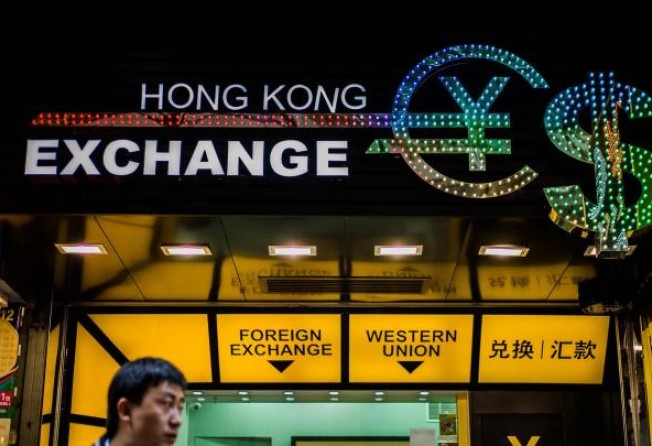
Hot money inflow expected to continue, analysts say
QE3, tense relationship between Beijing and Tokyo factors for influx of speculative funds

An influx of hot money into Hong Kong chasing the rising yuan has forced the city's financial chiefs to exchange HK$32.24 billion worth of local currency for US dollars in the past two weeks as they try to stop the Hong Kong dollar from spilling over its official limit of HK$7.75 against the greenback.

But this time, analysts expect a longer lasting inflow of hot money - so named for its speculative nature which means it tends to come in quickly and leave just as quickly.
For Hong Kong, protecting the peg is not an option. It was introduced in 1983 to ensure a fixed exchange rate against the US dollar, which means the HKMA must buy or sell in the market to keep the local unit trading within a range of HK$7.75 to HK$7.85 against the US dollar.
The monetary authority's last intervention came as HK$640 billion of capital poured into the city between October 2008 and the end of 2009. The influx came in the wake of the US Federal Reserve's first round of quantitative easing measures and was widely attributed to this controversial monetary policy.
Then, the Fed spent about US$1.7 trillion of newly created cash buying bonds back from US banks. By "printing money", it kept interest rates low to help homeowners and cash-strapped businesses, while the spare cash at the banks was intended to stimulate the economy.
But it also meant investment banks and financial firms ended up with more cash to invest in healthier overseas markets with higher rates of interest, such as Hong Kong.
Mark Konyn, chief executive of Cathay Conning Asset Management, blamed the latest hot money inflows on the Fed's September announcement of a third round of quantitative easing, called QE3. The Fed will buy US$40 billion of mortgage debt each month without a specified end date. The Fed would also hold the benchmark interest rate close to zero until at least mid-2015.
In addition, the week before QE3 was announced, the European Central Bank unveiled an unlimited bond-purchase programme and vowed to keep interest rates low. The Bank of Japan also joined in, expanding its asset-purchase fund by 10 trillion yen (HK$969 billion).
"All of this monetary stimulus has been causing some investors to move money back to the region," Konyn said. "Central banks are cautious about the effects of hot money," he said, adding that it could prove positive for asset prices in the short term.
"However, these distortions will impact domestic consumption, causing economies to consume less of their own manufactures in favour of exports," he said. "Ultimately, it will cause central banks to raise interest rates."
Stephen Sheung, an investment strategist at SHK Private, expects the latest round of hot money inflows to Hong Kong to last a long time but at lower levels than those in 2009.
"We should note that the QE3 is open-ended: the US Federal Reserve has not said when it will end. This means the inflows to Hong Kong are also open-ended," Sheung said.
He said the rising yuan and figures showing signs of economic recovery on the mainland was boosting inflows as overseas money bet on the yuan-denominated investment products available in the city.
Andrew Fung Hau-chung, executive director of Hang Seng bank, said the capital inflow this time started with an apparent asset re-allocation by some traditional funds that increased the weight of Hong Kong or mainland shares in their global portfolios.
"The investment policy of this sort of fund is relatively long term. Thus, I am not sure this can be dubbed hot money," Fung said. "Of course, there can be more speculative flows after evidence of these inflows, to jump on the wagon. The increase in stock market volume has not been big enough to define the inflows as big. There is no apparent sign the inflows are being invested in property."
Louis Tse Ming-kwong, director of VC Brokerage, said the hot money inflows may have come from Japan, with investors shifting some mainland assets to Hong Kong as tensions increase between Beijing and Tokyo over the disputed islands in the East China Sea.
"Amid the tense relationship between mainland China and Japan, Hong Kong markets will become a safe haven for Japanese investors. The inflow will continue for a while," Tse said.